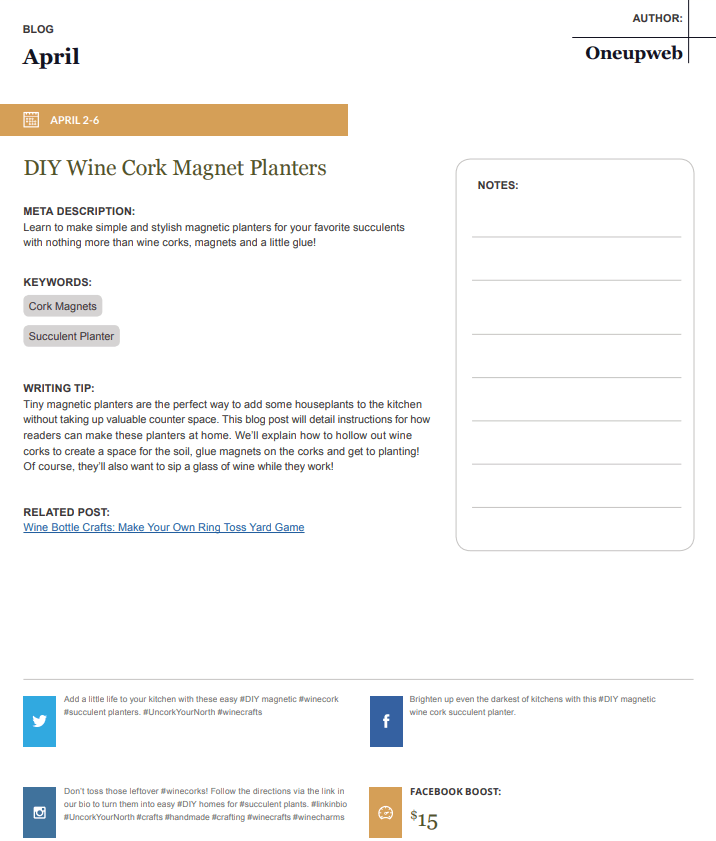Frequently Asked Questions About Annual Planning
It’s the end of another year . . . the time when you take stock of your marketing efforts, assessing what worked, what fell flat and where you need to improve. Even if your company’s fiscal year does not follow the calendar year, December is a great time to strategize and come into the new year feeling rejuvenated.
When it comes to annual planning, there is no shortage of digital marketing elements that need to be considered.
Okay, let’s get to the meat of it: The annual planning questions we hear most often from our clients:
Frequently Asked Questions About Annual Planning
How Does a Content Calendar Work?
You may or may not know that we’re big fans of content calendars. Primarily used for blogs, they represent a well-researched plan for attracting new users and creating brand engagement. It’s robust content marketing planning, in a tidy calendar form. Because when your content is:
- planned out a year in advance
- fully researched
- driven by data and
- already halfway written
… 2019 just feels so much more strategic and manageable. Let’s dig in, shall we?
Everything Is Data-Driven
We begin by identifying the keywords we want to target, based on search volume, competition and opportunity. Then we then filter these through five years’ worth of Google Search trend data, identifying exactly when people are searching for what. We also create a “topic map” of your internal content so we can see which topics are over- and under-represented.
Our Content Calendars Are Really Detailed
Like really, really detailed. After we’ve identified the keywords and topics we want to target, we write the titles of each blog, the outline, the social messaging that should accompany each post promotion, and we include boost and hashtag recommendations, among other elements. Here’s a sample page from one of our content calendars:

We want to make it as easy as possible for our clients to have someone on their internal team, or another vendor, be able to pick up our work and run with it. Of course, we also do a lot of the actual blog writing for clients.
The Execution Becomes the Easy Part
Whether we are writing the blogs or someone else is, the execution – after all this detailed planning has been completed – is the easy part. We’ve made it so that minimal research is required, and even a writer with very little familiarity of the client or the industry can easily reference the content calendar and produce high-quality pieces of writing. That’s how we write for users and search engines.
Can You Help with Campaign Planning?
Is “Breaking Bad” the greatest TV show ever made?

Campaign planning is one of those things that everyone defines – and delivers – a little differently. At Oneupweb, we plan campaigns around central themes and goals that are defined beforehand and adhered to strictly.
Usually, campaigns begin with an idea, which is then manifested as a tagline, a concept or just a notion that we want the audience to come away with. Sometimes the tagline stays consistent for the duration of the campaign. Other times it evolves based on the channel, season, business event or other milestone.
Many think campaigns are just a clever slogan, like the K-Mart “shipped my pants” campaign – something that’s designed to go viral. But campaigns can be geared toward brand awareness, goal conversions, donation drives and more, and virality is rarely the end goal. Campaign execution is rooted in audience analysis and careful planning. Which campaigns have we run for clients?
- We drove a 118% increase in donations for a nonprofit.
- We asked a city to bank naked and helped beat our client’s goals by 63%.
- We promoted gift cards for home cleaning services over the holiday season, increasing sales by 44%.
- In a one-month period, we executed a targeted “new movers” campaign and helped drive nearly $30,000 worth of leads for a painting company, from a $5,000 investment.
Yes, we can help with campaign planning!
What Is Seasonality Planning?
A seasonal campaign can be something as simple as updating the header image on your homepage four times a year to reflect a change of seasons. Or, it can be as involved as producing new ad creative and landing pages, updating social banners and website headers, creating videos, and coming up with a new concepts and taglines.
Seasonal marketing can look like anything you want it to. The only limits are our imagination (and your budget, of course). As with any campaign, it all comes down to planning and research. Here are some questions to help guide your thinking:
- Which seasons are most important, from a bottom-line perspective?
- During which seasons are you losing ground, either internally or to competitors?
- Do you have the resources needed to execute a seasonal campaign? Do you have summer photography, winter gear, etc.?
- What can you do in-house, and what do you need a partner’s help for?
It’s also important to remember that seasonal planning is not just about your business. Of course you want more customers, but the way to do that is not just to rely on clever messaging. If you’re a lawn care company, produce helpful content about what customers need to take care of before the snow comes, and what can be put off until spring. If you sell wine, provide some great ideas for seasonal activities that may not traditionally involve your product, but would be so much better with it. If you’re a nutrition counselor, create some short, digestible videos that offer quick tips on how to stay healthy during the holidays or what “back to school” means for kids’ eating habits.
Above all, set clear goals, understand which channels can help you meet those goals, and don’t overextend yourself. Do a couple things really well and then expand as your time and resources allow.
How Should We Spend Our Marketing Budget?
To begin, here are several ways not to spend your marketing budget:
- Don’t develop an app. Just don’t do it. Unless you have a globally known service or product, you do not need an app. Very few people will download it, and even fewer will actually use it.
- Don’t use marketing resources on the boss’ pet project. Especially if that pet project is an app. A good boss will welcome the voice of reason.
- Don’t go all-in on an employee advocacy program if your employees are “meh” about working there. Marketing does not fix foundational problems.
- Don’t spend a bunch of money on paid campaigns if your website isn’t going to close the deal. You (or we) can bring lots of traffic there, but if your website isn’t in line with what users expect from a design, content and UX perspective, you’ll just be throwing good money away.
So how should you spend your marketing budget? You’ve heard it before, and we’ll say it again: it depends on what you want to achieve.
If you need more sales, and you need them now, consider a paid media campaign instead of SEO. If you’re new to the area and no one knows about you, think about targeted Facebook ads or YouTube videos for brand awareness. If you bring traffic into the site but your shopping cart abandonment rate is higher than you’d like, launch a retargeting campaign that sweetens the purchase offer (or user test your shopping cart and make key UX improvements).
Whatever your goals, be strategic and understand that there is no magic switch to flip. Launch, test, analyze, test some more, improve,analyze, get a second opinion, test, improve, and then do it all over again.
If you want to get more specific with some free annual planning advice for your business, call me (David) at (231) 922-9977 x 163, or shoot me an email at ddoran@oneupweb.com. No sales or sign-ups – just two people talking shop.